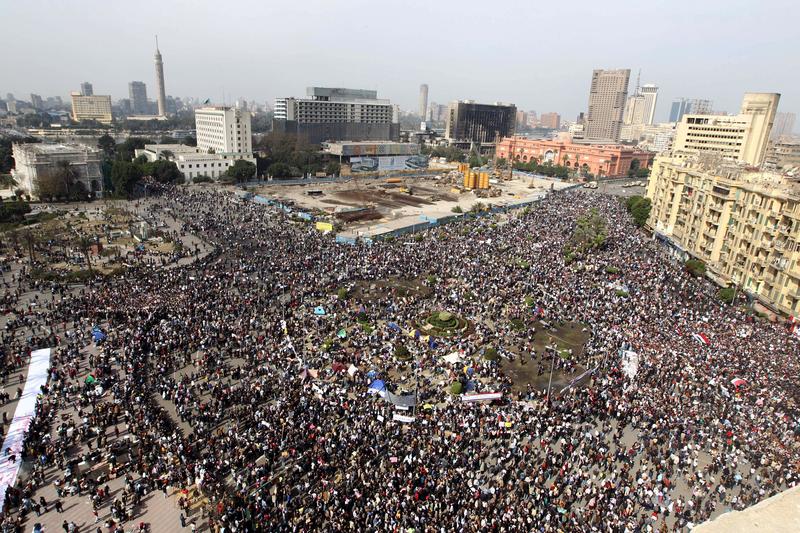
Welcome to Politics Bites, where every afternoon at It's A Free Country, we bring you the unmissable quotes from the morning's political conversations on WNYC. Today on The Brian Lehrer Show, NPR's National Security correspondent, Rachel Martin, spoke about the potential of the popular uprising spreading further through the middle east, and the uncertainty around what will come next in Egypt, assuming Hosni Mubarak falls.
King Abdullah II of Jordan fired his government Tuesday in an apparent concession to protesters, sparking rumors that the wildfire revolution raging from Tunisia to Egypt won't stop at two countries.
Jordan, like Egypt, is a critical ally for the United States in the region. King Abdullah II has his critics, but overall is a much more popular figure than Mubarak, said Martin, so it's unclear whether protests will continue there. Demonstrations have been taking place in Amman for months against unemployment, high food and fuel prices, but Tunisia's successful revolt and Egypt's massive protests have injected a burst of energy into the movement.
You've got this lethal combo of a lot of young folks who are tapped into social networks, very internet savvy, and their expectations are rising. They look at their governments and say, 'You're not providing for us. We don't have work here.' And then they look in their neighborhoods, in the larger region, they see these protests happening and it's igniting things around the Middle East.
Each country in the region often referred to as the "Arab world" has a distinct set of variables affecting its political plight. Jordan has a huge Palestinian population (about half of the entire country), much of which is young, grew up in refugee camps, and is unemployed. But the harsh police state in Egypt and Tunisia does not exist in the same way.
So the million dollar question facing the U.S. is if we're seeing a type of fundamental restructuring in North Africa and the Middle East, a version of 1989's perestroika of the Soviet Union. The administration won't admit publicly that's what they are concerned with—but Martin said it is purposely being cryptic.
I think what's really interesting about this situation is how much of a spectator the United States is really being forced to play. They don't have a lot of options right now, which is ironic considering the amount of money the United States has funeled into the Egyptian military over the past 30 years. But how much leverage has that bought in a situation like this? It's really hard to say.
On the one hand, the U.S. can't afford to be too closely aligned with Mubarak, and on the other, they can't directly call for his ouster, because then Obama would look like the enemy of democracy (By Tuesday afternoon, though, there were reports that Obama urged Mubarak not to seek reelection in September). The ambiguity leaves ElBaradei room to criticize the U.S. administration for not supporting the opposition.
It would make sense to hear him say, 'Listen, United States, if you're going to preach human rights, if you're going to talk about the need to pursue democratic reforms in Egypt, this is your chance! This is your chance to get behind the protest movement, to support the call for true democracy, and to do it with gusto, not with this kind of mealy mouthed suggestion that it's time for democracy and we're going to wait and see. He wants a much stronger line from the administration and this gives him the street cred that he needs because he is an outsider.
ElBaradei has spent a great deal of time living in the West, so he also has to show he's not a puppet of the U.S. to gain Egyptian support, said Martin. But the reality is that ElBaradei may be more palatable to the West than he would be to the Egyptian population, and the Muslim Brotherhood in particular, despite their backing him for now. Martin thinks it's unlikely the Brotherhood will support him in the long run. "They'll want to field their own candidate, but they see him now as a tool to get them to September," she said.
As for the Muslim Brotherhood, the U.S. administration and media outlets are scrambling to figure out its identity. Some experts report that the party has evolved and is no longer the hard line Islamist movement that it once was, and that Mubarak just fed that reputation as a justification for military funding and U.S. support. That's ElBaradei's line, though of course he needs the Brotherhood's backing to get anywhere in Egypt, because they are the only cohesive opposition party even if they aren't at the heart of the uprising.
What's interesting about these protests is that they are such a seemingly organic, grassroots protest movement, from not just the Muslim Brotherhood, but from secular Egyptians who are critical of the Mubarak regime, but who are not advocating for some kind of theocracy.
In the end, the U.S. is primarily interested in stability in the region — not only concerning Israel, but to secure trade through the Suez canal and American intelligence operations to combat Islamic fundamentalism. "It's hard to overstate how important it is to have a government in there that is friendly to the U.S." said Martin.